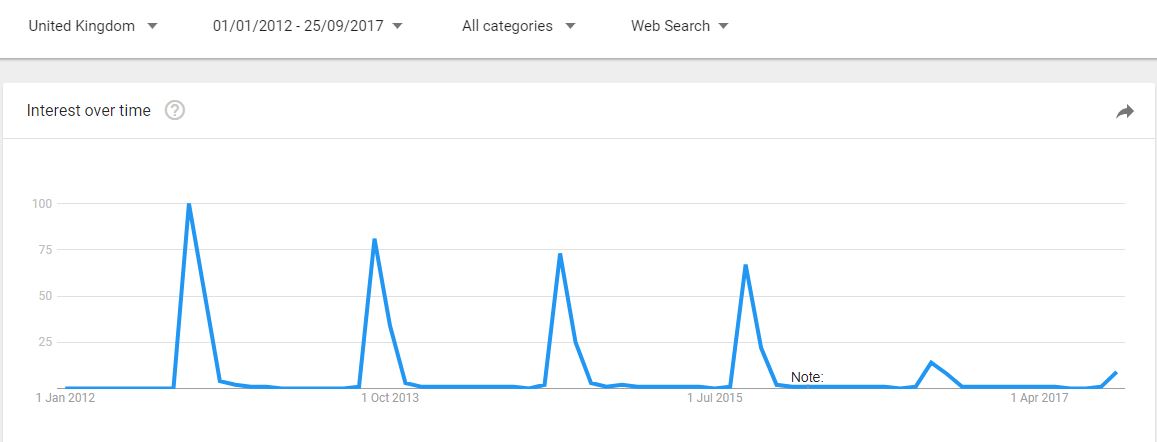An Absolute Shitshow

With so much happening behind the scenes at Facts Towers I almost, almost missed this large, festering pile of bantha poodoo. I say almost, because, well it’s bloody difficult to miss it.
Y’see, an article in The Sun no less gives the impression that Cancer Research UK is putting some vape-friendly ads out. I haven’t seen them myself, so I have no idea what they look like. Remember, it is fast approaching “Stoptober”, the annual public health splurge on convincing folks that you really should be stopping smoking now.
Naturally, interest in Stoptober has been in decline for a few years, as has the budget being spent; as has general interest from smokers in going to a stop smoking service. After all, with a declining smoking rate in the UK, there’s going to be less interest.

Google Trends for “Stoptober” – 01/01/2012:25/09/2017
But I’m not here to write about Stoptober (not again, I’ve done that once before), instead, I’m writing about the patent stupidity of folk that believe that just because they work for Big Public Health, they can get away with breaking the rules.
ADVERTS by Cancer Research urging Brits to quit smoking are at the centre of a row over barmy Brussels rules that would ban them, The Sun can reveal.
The leading cancer charity want to launch an advertising blitz next month as part of the annual “Stoptober” to urge smokers to “quit or switch” to using e-cigarettes.
But charity sources say they were warned by the Advertising Standards Agency (ASA) that they will be breaking EU rules by promoting vaping e-cigs — despite research showing it is 95 per cent safer than traditional smoking.
Aside from some barmy choice of words from The Sun article, it is highlighting a bit of a problem, one which Clive pointed out here. But first, let’s rewind a bit.
Member States shall ensure that:
- commercial communications in Information Society services, in the press and other printed publications, with the aim or direct or indirect effect of promoting electronic cigarettes and refill containers are prohibited, except for publications that are intended exclusively for professionals in the trade of electronic cigarettes or refill containers and for publications which are printed and published in third countries, where those publications are not principally intended for the Union market;
- commercial communications on the radio, with the aim or direct or indirect effect of promoting electronic cigarettes and refill containers, are prohibited;
- any form of public or private contribution to radio programmes with the aim or direct or indirect effect of promoting electronic cigarettes and refill containers is prohibited;
- any form of public or private contribution to any event, activity or individual person with the aim or direct or indirect effect of promoting electronic cigarettes and refill containers and involving or taking place in several Member States or otherwise having cross-border effects is prohibited;
- audiovisual commercial communications to which Directive 2010/13/EU of the European Parliament and of the Council applies, are prohibited for electronic cigarettes and refill containers.
As Clive pointed out, there’s specific mention of commercial activity. But, this is where it gets a bit murky as one phrase has bugged me for a while - “commercial communications in Information Society services”.
An “information society service” is defined as “any service normally provided for remuneration at a distance, by means of electronic equipment for the processing (including digital compression) and storage of data, at the individual request of a recipient of the service” (derived from, wait for it, another EU Directive - natch).
Doing some digging, I stumbled across two distinct cases surrounding this definition. One for Google and one for eBay. From an outside perspective, these two are completely different offerings. After all, one is a major internet search engine, and the other is an online marketplace/auction site.
Yet, according to the CJEU, they are both information society services. By the CJEU’s own rulings in those two cases, there’s no need for the “commercial” word to be part of this definition for Article 20, Section 5, point 1.
Remember, these regulations were lobbied for by the likes of Cancer Research UK and Action on Smoking & Health (among others). As the UK is usually the “good boy” when it comes to interpretation of the law, it’s difficult to see how the Department of Health and CRUK can believe they should be exempt from the regulations they lobbied for.
Today it emerged the Department of Health had stepped in to say public health campaigns should be exempt from the Brussels ruling.
The Department for Health believe “the prohibition would not cover public health campaigns about the relative risks of e-cigarettes verses tobacco products by Public Health England or local stop smoking services.
Thing is, it’s not quite so simple. It never is. See, the transposition of the TPD into domestic legislation didn’t quite carry the same specificity:
42.—(1) No person may in the course of a business publish, or procure the publication of, an electronic cigarette advertisement in a newspaper, periodical or magazine.
43.—(1) No person may in the course of a business include, or procure the inclusion of, an electronic cigarette advertisement in an information society service provided to a recipient in the United Kingdom.
As a registered charity Cancer Research UK is technically exempt, but then the ASA view things completely differently. After all, the Broadcast Code of Advertising Practice (BCAP) exists for a reason.
Thus, CRUK and PHE (Stoptober) must then adhere to the relevant sections of the Code of Advertising Practice (either print or broadcast), the very same rules that have to be applied to every vape shop and manufacturer across the board.
After all, it doesn’t take much for the Advertising Standards Authority to investigate any potential breaches of the said code.
The article from The Sun has landed at an opportune time because the ASA is currently consulting the public about these very regulations, and asking if advertising claims about the relative risk of e-cigs should be allowed. I think this shitshow shows that the answer is an emphatic and resounding yes.
Naturally, it would be better all round if someone had the cajones to kick the farcical regulations we’ve been landed with, square in the intimate parts and off the statute books for good (not that that is actually going to happen, natch).
Otherwise, the ASA is going against its stated goal:
We respond to concerns and complaints from consumers and businesses and take action to ban ads which are misleading, harmful, offensive or irresponsible.
By banning truthful statements by PHE/CRUK and ecig vendors, they’re just further muddying the waters, especially when IPSO can’t (or won’t) keep much of a lid on piss-poor churnalism which has led to substantial misconceptions surrounding the relative risks of vapour products.
What a shitshow.
Footnote: Postings will likely be sporadic for the next few months, but I’ll try to keep on top of things when I can!